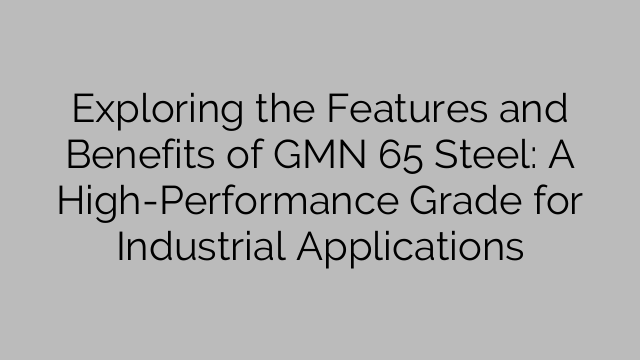Exploring the Features and Benefits of GMN 65 Steel: A High-Performance Grade for Industrial Applications
Propriétés mécaniques:
1. High Tensile Strength: GMN 65 steel exhibits excellent tensile strength, making it suitable for applications that require a high level of mechanical stress.
2. Superior Hardness: The steel possesses high hardness, which enhances its resistance to wear and abrasion, increasing the lifespan of components made from it.
3. Good Ductility: Despite its high hardness, GMN 65 steel maintains good ductility, allowing for the bending and shaping of components without significant cracking or breakage.
4. Impact Resistance: This steel grade offers exceptional impact resistance, making it ideal for applications where components may be subjected to sudden and heavy forces.
5. Fatigue Strength: GMN 65 steel demonstrates excellent fatigue strength, enabling it to withstand repeated loading and cyclic stress without failure.
Propriétés techniques :
1. Heat Resistance: GMN 65 steel exhibits excellent heat resistance, allowing it to retain its mechanical properties even at high temperatures.
2. Corrosion Resistance: The steel grade possesses good corrosion resistance, ensuring its longevity and reliability in industrial environments where exposure to chemicals or moisture is common.
3. Machinability: GMN 65 steel is easily machinable, enabling efficient and precise shaping of components during the manufacturing process.
4. Weldability: The steel grade offers good weldability, allowing for the seamless joining of components through welding techniques without compromising their strength.
Composition chimique:
GMN 65 steel typically consists of the following chemical composition:
– Carbon: 0.60% – 0.70%
– Manganese: 0.80% – 1.00%
– Silicon: 0.15% – 0.35%
– Phosphorus: 0.040% (maximum)
– Sulfur: 0.040% (maximum)
– Chromium: 0.90% – 1.20%
– Nickel: 0.30% – 0.50%
– Molybdenum: 0.15% – 0.25%
The precise chemical composition may vary slightly depending on the manufacturer and specific application requirements.

